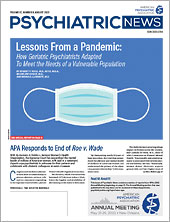The diagnosis of Alzheimer’s disease relies on clinical assessment of symptoms, but blood-based biomarkers are likely coming soon and could dramatically change how the condition is diagnosed, said Art Walaszek, M.D., at APA’s 2022 Annual Meeting.
Meanwhile, treatment calls for “a holistic approach that includes addressing psychological issues, caregiver burden, and planning for the future,” said Walaszek, a professor of psychiatry and vice chair for education and faculty development in the Department of Psychiatry at the University of Wisconsin School of Medicine and Public Health.
Typical management of dementia due to Alzheimer’s involves the use of a cholinesterase inhibitor and/or memantine and the treatment of associated depression or other comorbidities. Psychosocial interventions are crucial: family and caregiver education and support, encouragement of socialization, exercise and cognitive activities, and counseling about diet.
Walaszek outlined the epidemiology and clinical presentation of Alzheimer’s disease and described how to distinguish between mild cognitive impairment and dementia and how to develop a comprehensive treatment plan for patients with dementia. The number of dementia-related cases are projected to increase worldwide to more than 50 million among men and more than 75 million among women, according to the February 1 issue of Lancet Public Health. Causes of dementia include Alzheimer’s, Lewy body disease, alcohol abuse, and vascular dementia.
Mild neurocognitive disorder in DSM-5 entails modest decline in one or more cognitive domains; activities of daily living are largely intact but may require greater effort, compensatory strategies, and accommodations. It may or may not manifest in behavioral disturbances. Major neurocognitive disorder involves more severe decline in several cognitive domains and impairment of activities of daily living but may or may not manifest in behavioral disturbances.
Psychiatrists treating patients with Alzheimer’s disease should consider a cholinesterase inhibitor and/or memantine and decrease or eliminate medications that affect cognition. They should counsel patients to decrease use of alcohol and/or cannabis while promoting socialization, cognitive stimulation, and exercise. They should also provide education and support to family/caregivers and work with patients to promote meaning and purpose.
Walaszek also emphasized the limitations of the current understanding about the role of anti-amyloid monoclonal antibody therapies in the treatment of Alzheimer’s, especially aducanumab (Aduhelm). The medication was approved last year under the Food and Drug Administration’s accelerated approval pathway, which allows for fast-tracked approval of medications that are shown to have a therapeutic effect likely to benefit patients.
In two phase 3 studies, aducanumab was found to significantly decrease the burden of amyloid, which has been associated with the development of Alzheimer’s, but only one of those trials showed an effect on cognition, which was modest. “It’s far less clear how helpful aducanumab is clinically, leading to a lot of controversy and confusion,” Walaszek said.
He explained that the FDA accelerated approval requires a phase 4 confirmatory trial to be completed by 2029. He said there have been concerns about potential risks associated with the use of monoclonal antibodies, especially cerebral edema or hemorrhage that show up on MRI as amyloid-related imaging abnormalities (ARIA).
Because of this, patients must have a baseline MRI plus at least two or three MRIs during treatment, requiring radiologic expertise to determine severity. Genetic testing is advised since individuals carrying the APOE gene are at higher risk for Alzheimer’s. Patients who have symptomatic ARIA or radiologically moderate/severe ARIA must stop taking the drug and receive monthly MRIs until ARIA resolves, Walaszek said.
Also, there are concerns about costs of the drug and resources necessary to administer it. A report last year by KFF (Kaiser Family Foundation) stated: “If 1 million Medicare beneficiaries receive Aduhelm, which may even be on the low end of Biogen’s expectations, spending on Aduhelm alone would exceed $57 billion in a single year—far surpassing spending on all other Part B-covered drugs combined. In fact, this amount is roughly the same that Medicare paid for all hospital outpatient services in 2019. Medicare beneficiaries would face about $11,500 in coinsurance for one year of Aduhelm treatment, which represents nearly 40% of the $29,650 in median annual income per Medicare beneficiary in 2019. Because Aduhelm is not a cure for Alzheimer’s disease, patients could incur these annual out-of-pocket costs over multiple years.”
In April, the Centers for Medicare & Medicaid Services determined it would cover aducanumab only for people in randomized, controlled trials. ■

